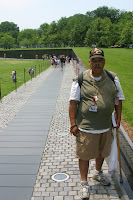Forty-three percent of homeless men over 25 are veterans, although veterans represent only 27% of men over 25 in the population at large.

(Photo: Odonnell Parker, homeless Vietnam veteran, Vietnam Memorial, Washington, DC,
by Evan Robinson, Group News Blog, 20090602)
by Evan Robinson, Group News Blog, 20090602)
This is Odonnell Parker. I met him at the Vietnam Memorial on the National Mall on a Tuesday afternoon. He was feeding the squirrels with peanuts that he gets free from a local vendor. He knows all the numbers about the Wall -- how many names, the oldest, the youngest, how many women -- and he comes here every day to visit 27 friends.
Mr. Parker is wearing a 101st Airborne cap with Special Forces and LRRP insignia on it. He's missing most of an index finger and has scars on his face that look like shrapnel entry wounds. He speaks slowly but otherwise seems perfectly present and aware. He explains that his wife has been dead for years and he recently lost his only son to a motorcycle accident, so he no longer has family to stay with. He's here partly because he has to leave the homeless shelter every day between 6am and 7am and they won't let him back in until the evening. His basic VA benefits have apparently run out and there's nothing more they can or will do for him.
According to a CNN article from 2008, there are nearly 200,000 homeless veterans nightly in America. The majority are veterans of Viet Nam, but an increasing number of Iraq/Afghanistan vets are finding it difficult to find affordable housing upon their return. It's estimated that as many as 500,000 veterans were homeless as recently as 2004, and the Veterans Administration had only capacity to serve 100,000 of them.
So a host of other organizations have sprung up to assist veterans, many of them started or operated by veterans. The VA is partnering with military and civilian organizations across the US to operate Homeless Veteran Stand Down events where they provide free services like haircuts, meals, health services, clothing, and sometimes housing to homeless veterans for short periods.
I believe Odonnell Parker when he tells me his story, but even if his story isn't true, it's clear that there are plenty of homeless veterans that we need to take care of. Their service demands no less, and our failure to adequately care for them speaks volumes about the morality of America and the American political and economic systems.
If we will not take care of our soldiers who have returned home, who will? If we will not care for them in their illness, their age, and their solitude, who will?
[Update 20090704 1053PDT: Link to a discussion of Mr. Parker from 2005]





|